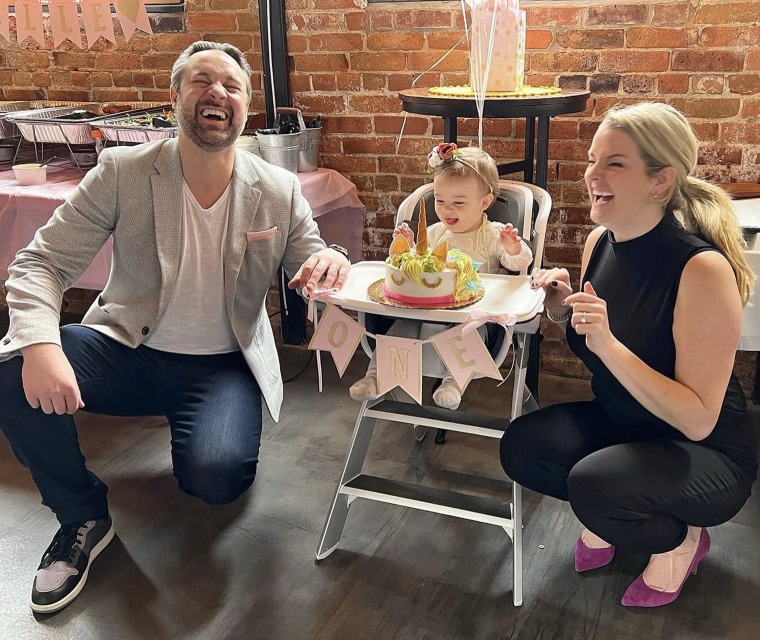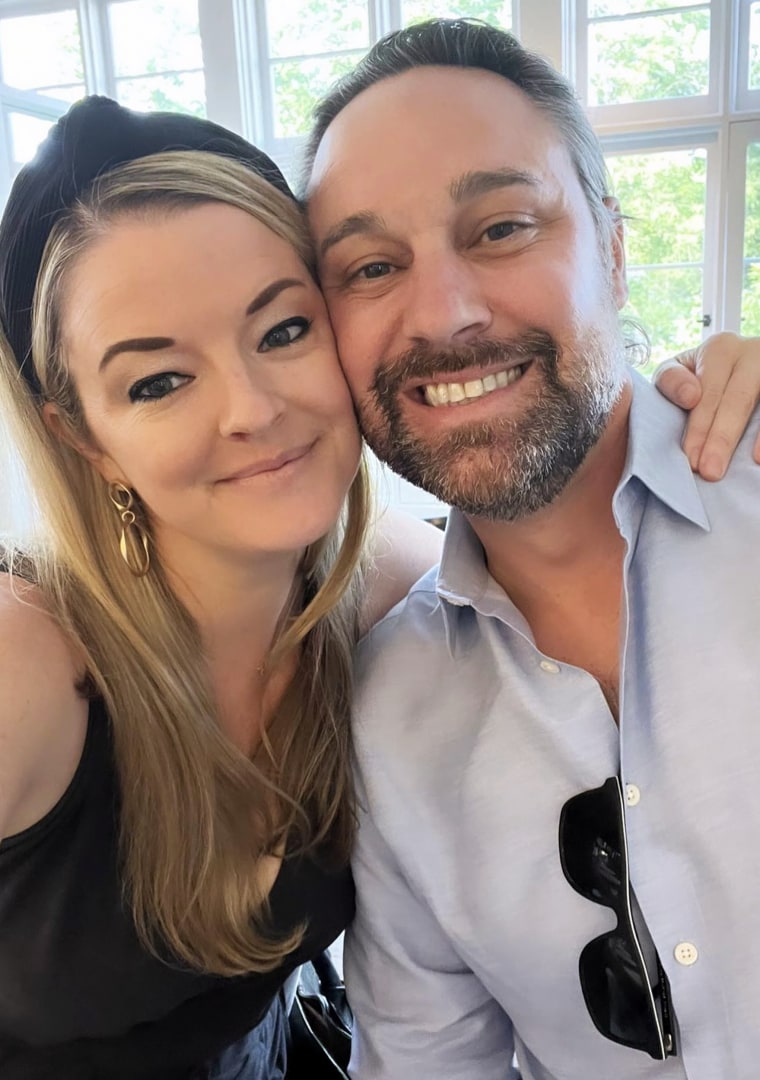This January, Lauren Corcoran, then 38, wanted to get her groove back after her first year as a mom and started training for a half marathon. Soon after, she tweaked a muscle in her neck. An X-ray spotted what seemed like a past injury but that didn’t sound right, and she asked for another X-ray. That X-ray found something unexpected — a mass in her lung that later testing showed was stage 3 lung cancer.
“It was an out of body experience,” the 39-year-old human resources professional from Stamford, Conn. tells TODAY.com. “Particularly for a healthy, nonsmoker who has always been really active and eats healthy.”
A neck strain leads to incidental diagnosis
Soon after celebrating baby Elle’s first birthday, Corcoran bought a Peloton, an Apple Watch and started boot camp workouts and running.

“I was going to finally start … focusing on myself,” she says. “Honestly, it’s probably the best cardio shape I’ve been in in quite a while.” While lifting at the gym, she pulled a muscle in her neck. At the time, she had just moved to Stamford and was trying to find a primary care doctor. It was a seven-month wait for an appointment, so she visited a chiropractor who helped her schedule a visit with a doctor the next day. The doctor performed blood tests (which came back as normal) and sent her for an X-ray. But the findings didn’t make complete sense. The X-ray detected slight inflammation in disc three at the top of her neck and also picked up an “odd density” close by, likely the result of a childhood injury.
“I called my parents and was like, ‘Did I have a childhood injury to my shoulder?’ which was a no,” she recalls. “I had a gut feeling that it was weird.”
She pushed for a second X-ray where the results were clearer.
“This was a fairly large tumor,” she says. “’In the course of 24 hours I went from perfect bloodwork, feeling like I was in the best shape I’ve been in since the baby to a CT scan to figure out what it was.”
The test occurred late in the week and Corcoran needed to wait through the weekend for her diagnosis. But doctors suspected cancer because of its “jagged edges.” She also needed to undergo a PET scan and an MRI to make sure it hadn’t spread into her brain. Soon after, doctors diagnosed her with stage 3 lung cancer.
“It was exceptionally overwhelming,” she says. “The devastation around that time of not knowing. I remember saying 'am I going to make it to (Elle’s) second birthday?'”
She met with a team at Stamford Health who planned her treatment. First, she started with fertility preservation because she and her husband had hoped to have another child. After she completed that she underwent concurrent chemotherapy and radiation to try to shrink the tumors so they would be small enough to remove surgically.
“I didn’t realize that if that didn’t work, I wasn’t a candidate for a cure,” she says. “I’m blessed to have my body respond so well to chemo and respond so well to radiation.”
After about a month of recovery, she underwent a lobectomy surgery, where doctors removed half of her left lung.
“It went much longer than it needed to, but they were able to remove everything they could see,” she says. “I was in the ICU for six days. That was the first time I hadn’t seen my baby (for so long) and that was really hard.”
Corcoran learned that she had a mutation on her EGFR gene that contributed to her cancer. According to the American Lung Association, EGFR-positive cancers contribute to about 10% to 15% lung cancers.
“It’s a mutation that’s happening in nonsmoking, predominantly females in their 30s and 40s,” she says. “People that wouldn’t have any of the risk factors that you wouldn’t really look at the lungs for any reason.”

Now, she takes an oral medication that targets EGFR mutation.
Corcoran will take that medication for about three years and it could help her get into remission, which would be “amazing," she says. “My first scan was about a month ago and it showed no evidence of cancer.”
Lung cancer in nonsmokers
The greatest risk factor for developing lung cancer remains smoking but experts have noticed a newer development: More young women who are nonsmokers are developing lung cancers.
“We don’t really know why that’s happening, but we are seeing the trend,” Dr. Michael Ebright, director of thoracic surgery at Stamford Hospital and clinical associate professor of thoracic surgery at Columbia University Medical Center, who treated Corcoran, tells TODAY.com. “Smoking still is the dominant risk factor in women. It increases the chance of developing lung cancer by 25 times. But the incidence of lung cancer in women who are nonsmokers is twice as high as men who are nonsmokers.”
While emerging cases of women nonsmokers with lung cancer remain worrisome, doctors now have therapies that have transformed lung cancer outcomes, especially in the nonsmoker population.
“We have more treatments available for the types of cancers that are found in the nonsmokers, the adenocarcinomas,” he says. “We’re actually sequencing the genome, sequencing the DNA of these tumors to determine whether particular genetic mutations exist and we can leverage much newer medications that are extremely effective.”
New treatments that target genetic mutations make a dramatic impact on the lives of lung cancer patients.
“Lung cancer patients are now living longer than they used to live,” Ebright says. “What we hope to do is transform advanced lung cancer to a chronic disease that can be managed rather than deadly.”
In the vast majority of cases, the mutation Corcoran had, EGFR, is not hereditary, like a BRCA mutation, for example. Experts believe it most often occurs randomly.
“It’s a sporadic gene mutation probably that happens because of genetic or environmental factors,” Ebright explains. “We have a drug that leverages this mutation … patients generally have a very good response (to it).”
Corcoran’s mutation still was somewhat abnormal so the care team started with radiation, chemotherapy and surgery before offering the targeted medication to give her the best outcome. For now, Ebright commends Corcoran as “amazing” and “motivated” for how well she’s been thriving post-treatment, though the two will still meet frequently to avoid a recurrence.
“She’ll be getting scans regularly to make sure she doesn’t have a recurrence,” Ebright says.
By the time patients start experiencing symptoms of lung cancer, it has normally become advanced, Ebright notes. Still, patients should talk to their doctor if they:
- Have a persistent cough that’s unlike a smoker’s cough.
- Cough up blood.
- Feel chest pain.
- Experience bone pain.
- Have shortness of breath.
- Grapple with headaches.
- Feel dizzy or lightheaded.
“Lung cancer can spread to the bones and can spread to the brain so you can get pain there, too,” Ebright adds.
As experts continue investigating the emerging trend of nonsmoking women developing young cancer, Ebright offers reassurance.
“Lung cancer is still rare in young, never smokers, but it is becoming more common than it used to be,” he says. “I don’t think women who are young and haven’t smoked should walk around worrying that they’re going to get lung cancer.”

Recovery and raising awareness
Five weeks after undergoing surgery, Corcoran ran a 5K.
“It was not an impressive one and I certainly had to stop a lot,” she says. She notes it was just a goal she set in her mind and decided to follow, no matter how difficult, adding, “I am a very determined person.”
After her first clear scan, she and her husband celebrated by visiting London. Since her diagnosis Corcoran possesses a new appreciation for life, embracing the joy in small moments like drinking coffee and watching Elle and their puppy play in the backyard.
“Don’t take any moment for granted,” she says. “It sounds very clichéd.”
Wanting to thrive motivated her through difficult treatments.
“If you’re not still living your life and engaging in life what are you fighting for? What are you going through all the sh-- treatments and the sickness and pain for if you’re not still engaging?” Corcoran says.

Corcoran hopes that by sharing her story she will increase awareness of lung cancer in nonsmokers.
“Like many people I thought of lung cancer as an aging disease for people who had smoked their whole lives. I didn’t know anything different. That’s the stigma associated with it,” Corcoran says. “Lung cancer certainly didn’t go with a 38-year-old new mom training for a half marathon. It’s been a massive learning curve.”
But she also wants her experience to be a reminder to new parents.
“New parent advocacy — it’s so easy to not check in with stuff about yourself,” she says. “Easily in another month or two it could have gone to stage 4.”
CORRECTION (Nov. 17 2023, 1:28 p.m.): An earlier version of this article misstated that the EGFR mutation is not hereditary. The vast majority of the cases aren't hereditary, but not all.